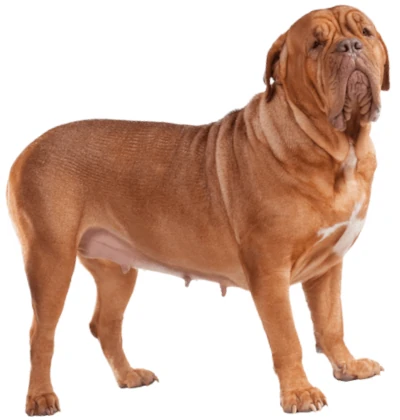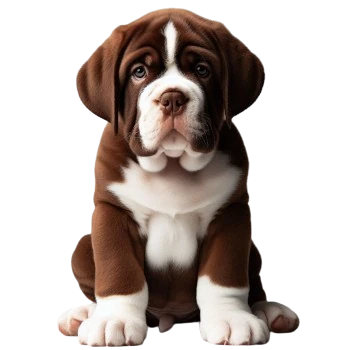
The Neapolitan Mastiff is a breed of dog originating from Italy, known for its imposing stature and impressive appearance. Originally used as a guard and defense dog, the Neapolitan Mastiff is also valued for its loyal and protective nature towards its family. With its distinctive coat and unique physical features, it is a remarkable companion for families who can manage its specific needs.
The Neapolitan Mastiff is a large, massive, and powerful dog. Males typically stand between 65 and 75 cm at the shoulder and weigh between 60 and 70 kg, while females are slightly smaller, measuring between 60 and 70 cm and weighing between 50 and 60 kg. Its body is robust, with a deep chest and well-developed musculature. The head is broad, with a marked forehead and a short, wide muzzle. The eyes are usually dark and convey great intelligence. The ears are set high, with a "V" shape, and naturally hang against the cheeks. Its skin is loose, with characteristic folds that add to its distinctive appearance.
The coat of the Neapolitan Mastiff is short, dense, and rough in texture. It is generally solid-colored, with shades ranging from black, gray, fawn, to sable. This coat is designed to provide good protection against the elements while being relatively easy to maintain. Regular brushing is necessary to keep the coat healthy and to manage dandruff and skin folds.
The Neapolitan Mastiff is known for its calm, protective, and loyal temperament. It is extremely devoted to its family and shows great courage and constant vigilance. Although it is generally reserved with strangers, it is rarely aggressive without reason. This breed is somewhat independent and can sometimes display a certain stubbornness, but with consistent training and positive reinforcement, it can be an excellent companion and a reliable protector. The Neapolitan Mastiff needs early socialization and proper training to handle its strong guarding instincts and tendency to be dominant.
The Neapolitan Mastiff is generally robust but can be prone to certain health conditions due to its size and physical characteristics. Common health issues include hip dysplasia, skin problems due to skin folds, and heart diseases. It is important to provide a balanced diet, regular veterinary check-ups, and proper weight management to maintain the dog's overall health. Special attention should also be given to the care of skin folds to prevent infections.

The Chiot Neapolitan Mastiff is a large dog, originally from Italy, known for its imposing appearance and gentle temperament with its family. With a powerful body and characteristic folds on its skin, this dog has historically been used as a guard dog and loyal companion. The Neapolitan Mastiff is protective, affectionate, and courageous, though it can be reserved with strangers. It requires consistent training, early socialization, and enough space to grow harmoniously. Despite its massive appearance, it has a calm nature and suits families with experience handling large breeds.
The price of a Chiot Neapolitan Mastiff depends on the breeder and pedigree. On average, a budget of around 2,000 euros is required.
The Neapolitan Mastiff, an impressive molosser with deep gaze, requires early and rigorous training to control its natural power while preserving its legendary calm.
Its rapid growth and massive morphology demand basic training (sitting position, leash walking) from 3 months to avoid handling issues.
The quintessential guard dog, it needs intensive socialization to temper its natural wariness of strangers without diminishing its protective qualities.
Its practical but sometimes stubborn intelligence responds better to short sessions (10-15 minutes) and positive methods than to long repetitions.
Extremely sensitive to tone of voice, this giant reacts perfectly to brief commands given in a deep, confident tone without raising volume.
Its need for moderate exercise should be met with activities suited to its morphology (slow walks, tracking games) to protect its joints.
Its exclusive attachment to its owner requires constant personal involvement - rarely delegate its training to others.